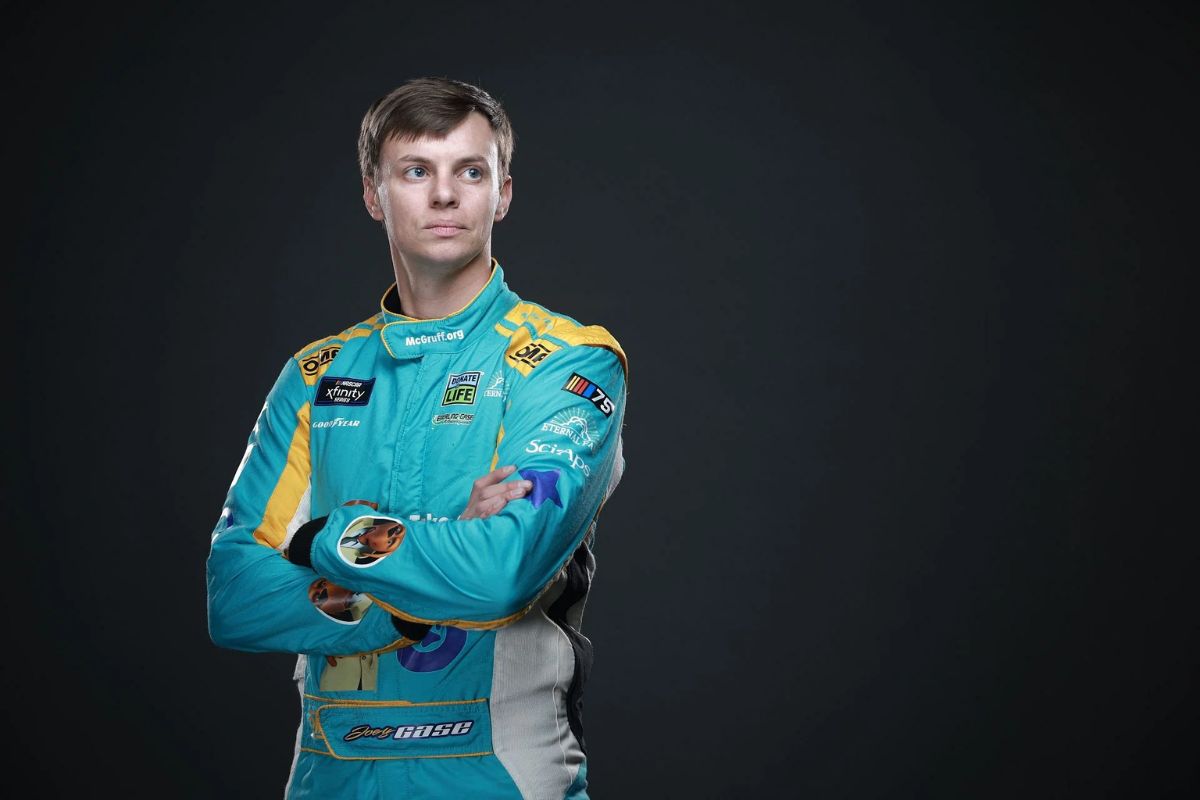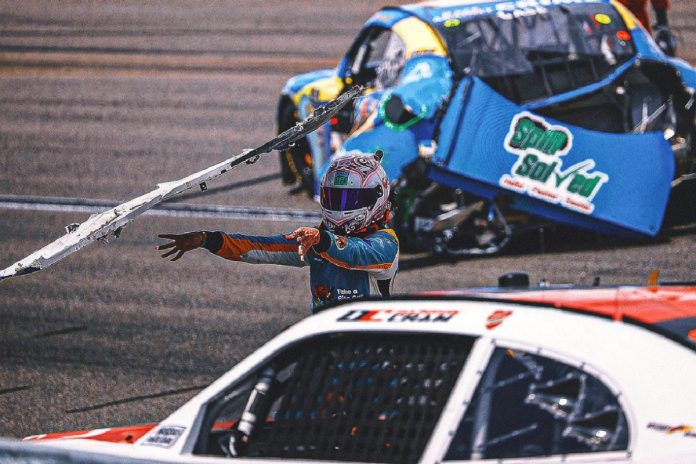Joey Gase Hit with 5K Dollar Fine: Joey Gase’s $5,000 fine for tossing a rear bumper at Dawson Cram during the ToyotaCare 250 Xfinity Series race highlights NASCAR’s strong commitment to safety and discipline. This penalty not only emphasizes the seriousness of following safety protocols but also establishes a precedent in conduct jurisdiction within the sport. The incident sparked a blend of amazement and discussion, showcasing the consequences of such actions on team dynamics, sponsorships, and NASCAR’s image. Additionally, it emphasizes the delicate balance between competitiveness and safety enforcement. The episode serves as a deterrent, reinforcing the importance of safety over emotions. Further examination reveals broader implications for professional racing’s safety and standards.
Key Takeaways
- Joey Gase was fined $5,000 by NASCAR for throwing a rear bumper at Dawson Cram during an Xfinity Series race.
- The fine emphasizes NASCAR’s commitment to safety and maintaining discipline within the sport.
- Gase’s actions sparked debate on safety, sportsmanship, and professional conduct in NASCAR.
- This penalty sets a precedent for how NASCAR may handle similar incidents in the future.
- The incident and its repercussions highlight the importance of adhering to safety protocols in professional racing.
Joey Gase Fined $5000 for Bumper Toss at Richmond Raceway
In a surprising turn of events at Richmond Raceway, Joey Gase, a driver for the No. 35 Joey Gase Motorsports team, has been fined $5,000 for his actions involving the tossing of the rear bumper at Dawson Cram in an altercation in the Xfinity Series race. This incident, which unfolded on the racetrack, has quickly escalated into a significant talking point within the motorsports community, not only for the rarity of such occurrences but also for the implications it holds for driver conduct and sportsmanship within the NASCAR series.
The fine imposed on Gase by NASCAR officials highlights the seriousness with which the organization views the safety of its participants and the integrity of the sport. The act of throwing a car part, in this instance, a rear bumper, regardless of the circumstances leading to the driver’s frustration, is deemed to directly violate the safety protocols established to protect drivers, crew members, and spectators similarly. This decision to penalize Gase financially serves as a clear message to all competitors regarding the non-negotiable nature of safety and sportsmanship standards in NASCAR.
NASCAR fined Joey Gase $5,000 for violating rule on a safety violation may be imposed for any action or omission by a competitor or vehicle that creates an unsafe environment or poses a threat to the safety of the Competitors, as determined by NASCAR.
— Bob Pockrass (@bobpockrass) April 3, 2024
Analyzing the broader implications, this penalty not only impacts Gase’s reputation but also sets a precedent for how similar future incidents will be adjudicated. It highlights NASCAR’s unwavering commitment to maintaining a secure racing environment, emphasizing that actions jeopardizing this ethos will not be tolerated. Moreover, it serves as a cautionary tale to all drivers about the immediate and tangible consequences of letting emotions override adherence to established safety protocols.

Surprise and Controversy: Gase’s Unusual Reaction Draws Attention
Joey Gase’s unprecedented choice to hurl his car’s rear bumper at Dawson Cram’s vehicle during a heated moment in the race has ignited widespread astonishment and debate among NASCAR enthusiasts and critics similarly. This event, marked by its rarity and the potential for the danger it posed, stands out as a moment of intense emotion boiling over into an act that has drawn both condemnation and intrigue within the racing community.
The significance of Gase’s action extends beyond the immediate repercussions, touching on several deeper themes within motorsport:
- Safety Concerns: The act of throwing a heavy car part during a high-speed event raises immediate questions about the safety protocols in place and the potential risks to drivers, team members, and spectators.
- Sportsmanship and Professional Conduct: Gase’s decision brings to light discussions about the expectations of professional behavior in the heat of competition and the boundaries that should not be crossed.
- Regulatory Response and Precedents: The incident prompts analysis regarding how NASCAR and other racing bodies respond to such conduct, including the consistency of penalties and the message it sends about acceptable limits of aggression.
- Impact on Team Dynamics and Sponsorship: Beyond the personal implications for Gase, this episode also has ramifications for his team’s reputation, potential strain with sponsors, and the broader image of the sport.
This unusual reaction by Gase has opened a multifaceted debate, reflecting not just on an individual moment of frustration but also on the broader values and safety standards that support the world of professional racing.
Additional Penalties Issued for Loose Lugs
While the controversy surrounding Joey Gase’s actions continues to spark debate, NASCAR has also addressed other regulatory concerns by issuing penalties to three Xfinity Series teams for infractions related to loose lug nuts post-race. The oversight, seemingly minor in the grand scheme of racing, highlights NASCAR’s stringent safety and performance standards, emphasizing the governing body’s strong commitment to fair competition and the well-being of its participants.
The penalties, specifically targeting the crew chiefs of the implicated teams, emphasize the critical role these individuals play in maintaining the integrity and safety of the vehicles. Each crew chief was fined, reflecting NASCAR’s enforcement policy that holds team leadership accountable for ensuring cars meet all regulations before, during, and after the race. This action sends a clear message to all teams about the importance of adherence to technical specifications and the consequences of lapses in this area.
Analyzing these penalties within the broader context of NASCAR’s regulatory environment, it becomes apparent that such measures are crucial in maintaining a level playing field. Loose lug nuts, while seemingly inconsequential, can lead to significant safety risks, including tire failures and accidents, potentially endangering drivers, crew members, and spectators. They can also impact a car’s performance, giving teams an unintended advantage.

Chandler Smith Supports Gase Amidst Controversy
Amidst the unfolding controversy, Chandler Smith, the victor of the race, has publicly expressed his support for Joey Gase, advocating for the right of drivers to display their emotions without the apprehension of incurring fines. Smith’s stance brings a fresh perspective to the debate around NASCAR’s penalty decisions, highlighting a broader conversation about the balance between professionalism and passion in motorsports.
In his statement, Smith highlights several key points:
- Thorough: Emphasizing that drivers, much like athletes in other sports, should have the freedom to express their emotions, given the high-pressure environment in which they operate.
- Central: Arguing that penalizing emotional expressions could negatively affect a driver’s performance, as it adds a layer of psychological pressure.
- Emphasize: Pointing out that drivers’ emotions and their expressions thereof are part of what makes racing engaging for fans, contributing to the sport’s entertainment value.
- Set the tone: Concern over the precedent this fine sets for future penalties, potentially leading to a stifled atmosphere where drivers are overly cautious about their behavior.
Smith’s support for Gase not only showcases solidarity among competitors but also invites a deeper examination of the norms governing driver conduct within NASCAR. By advocating for a greater understanding of emotional expressions in the sport, Smith contributes to a crucial discussion on how regulations can accommodate the human aspects of racing without compromising safety or professionalism. This stance is particularly relevant for an audience deeply invested in the mastery and intricacies of motorsport culture, offering a comprehensive view into the delicate balance between emotion and regulation on the track.
“I may get bashed for saying this, but I am all for drivers showing their emotions and letting them have at it. 10–15 years ago, them jokers were fighting on the pit road, and there wasn’t fines. I’ll probably get a fine for saying this right now. So, I like that, fans love it too,” ( Smith )
NASCAR’s Response: Upholding Safety Standards Amidst Driver Emotions
Balancing the delicate line between emotional expression and safety standards, NASCAR’s imposition of a $5k fine on Joey Gase highlights their steadfast dedication to upholding discipline and security on the track. This decision emphasizes the governing body’s unwavering commitment to ensuring that the competitive spirit and intense emotions that naturally arise in the heat of racing do not compromise the paramount importance of safety for drivers, teams, and spectators.
NASCAR’s response to incidents on the track, such as the one involving Gase, serves as a powerful reminder of the intricate framework of rules and penalties designed to maintain a safe racing environment. The fine levied against Gase is not merely a punitive measure but a reflection of NASCAR’s broader safety ethos. It illustrates how the organization navigates the complexities of managing driver behavior, ensuring that actions potentially jeopardizing safety are met with appropriate consequences.
Analyzing NASCAR’s handling of such situations reveals a delicate approach to governance, where safety protocols and penalties are meticulously crafted to deter behaviors that could lead to unsafe conditions. This incident, hence, becomes a case study of how NASCAR balances the passionate, often volatile nature of motorsport with a rigorous safety paradigm.

News in Brief
The imposition of a $5,000 fine on Joey Gase by NASCAR, following his actions at Richmond Raceway, highlights the organization’s commitment to upholding safety standards, even in the face of heightened emotions and unusual reactions from participants.
This incident, notable for its surprise and controversy, not only emphasizes the importance of maintaining decorum within competitive environments but also serves as a reminder of the consequences that can ensue from deviations from expected conduct.
The support from peers, such as Chandler Smith, and the additional penalties for technical infractions, further illustrate the complex interplay between rules enforcement and community solidarity within the sport.
Also read: Joey Gase’s Shocking Outburst: NASCAR’s Latest Scandal


